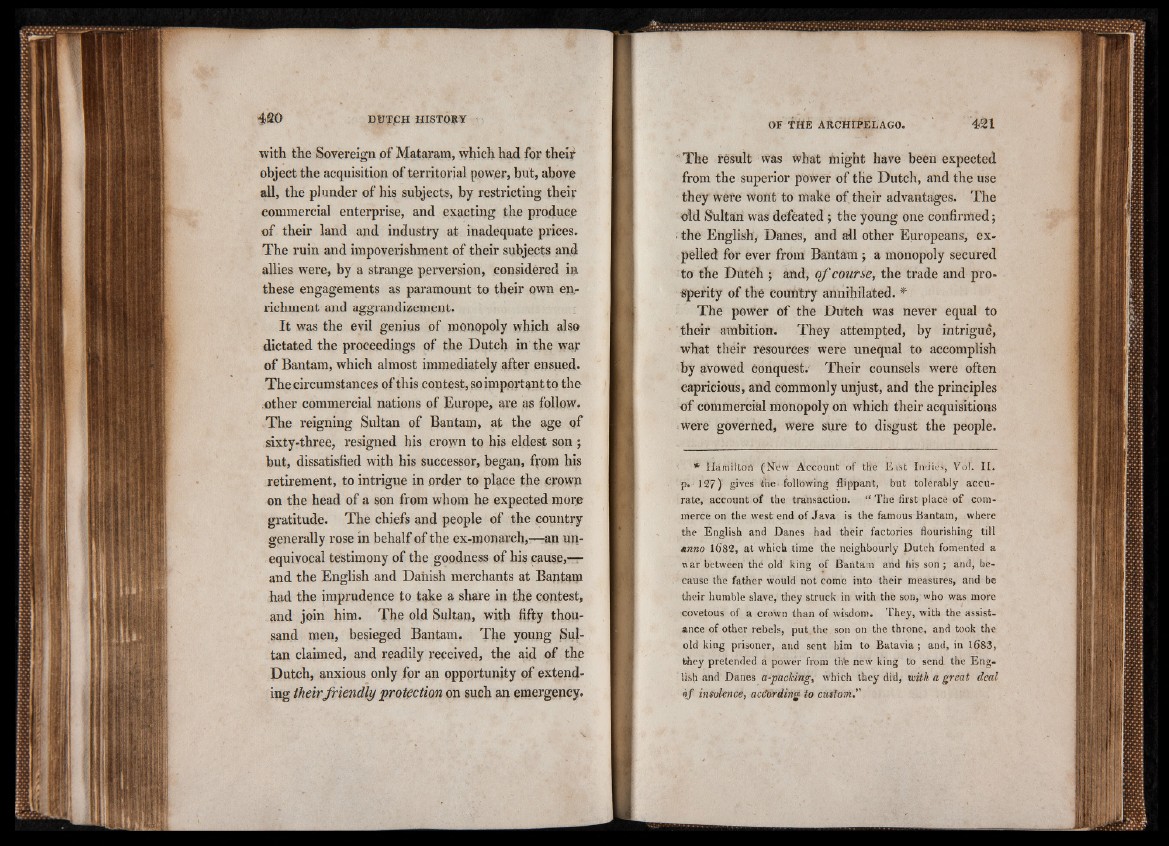
with the Sovereign of Mataram, which had for their
object the acquisition of territorial power, but, above
all, the plunder of his subjects, by restricting their
commercial enterprise, and exacting the produce
of their land and industry at inadequate prices.
The ruin and impoverishment of their subjects and
allies were, by a strange perversion, considered in
these engagements as paramount to their own enrichment
and aggrandizement.
It was the evil genius of monopoly which also
dictated the proceedings of the Dutch in the war
of Bantam, which almost immediately after ensued.
The circumstances of this contest, so important to the
other commercial nations of Europe, are as follow.
The reigning Sultan of Bantam, at the age of
sixty-three, resigned his crown to his eldest son ;
but, dissatisfied with his successor, began, from his
retirement, to intrigue in order to place the crown
on the head of a son from whom he expected more
gratitude. The chiefs and people of the country
generally rose in behalf of the ex-monarch,—an unequivocal
testimony of the goodness of his cause,-—
and the English and Danish merchants at Bantam
had the imprudence to take a share in the contest,
and join him. The old Sultan, with fifty thousand
men, besieged Bantam. The young SuJ-
tan claimed, and readily received, the aid of the
Dutch, anxious only for an opportunity of extending
their friendly ‘protection on such an emergency.
The result was what might have been expected
from the superior power of the Dutch, and the use
they were Wont to make of. their advantages. The
old Sultan was defeated; the young one confirmed;
. the English, Danes, and all other Europeans, expelled
for ever from Bantam ; a monopoly secured
to the Dutch ; and, o f course, the trade and prosperity
of the country annihilated. *
The power of the Dutch was never equal to
their ambition. They attempted, by intrigue,
what their resources were unequal to accomplish
by avowed conquest. Their counsels were often
capricious, and commonly unjust, and the principles
of commercial monopoly on which their acquisitions
were governed, Were sure to disgust the people.
* Hartiiltort ( New Account of the Eist Indies, Vol. II.
p. 127)' gives the-following flippant, but tolerably accurate,
account of the transaction, ff The first place of commerce
on the west end of Java is the famous Bantam, where
the English and Danes had their factories flourishing till
anno 1682, at which time the neighbourly Dutch fomented a
*\ar between the old king of Bantam and his son ; and, because
the father would not come into their measures, and be
their humble slave, they struck in with the son, who was more
covetous of a crown than of wisdom. They, with the assistance
of other rebels, put the son on the throne, and took the
old king prisoner, and sent him to Batavia ; and, in 1683,
they pretended a power from thte new king to send the English
and Danes a-pacJcing, which they did, with a great deal
èf insolence, according to custom."